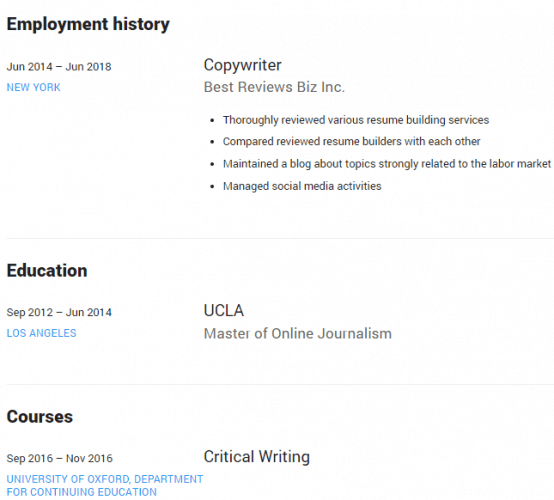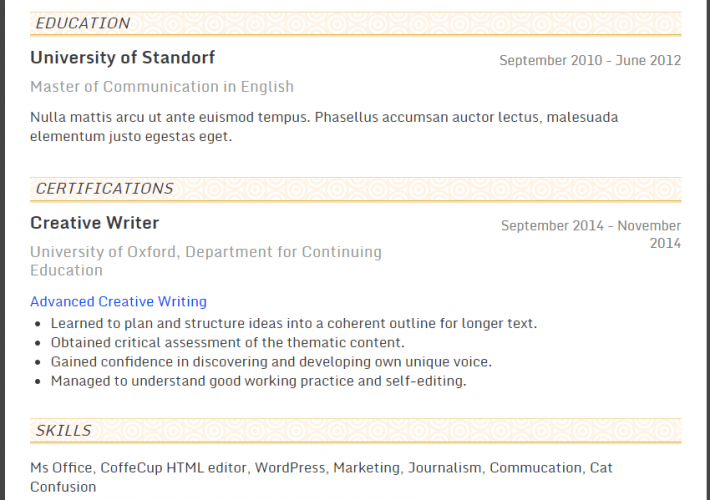Best Reviews> Resume Builders Reviews> Articles> Featuring Online Courses on Resumes
Best Reviews may receive compensation for its content through paid collaborations and/or affiliate links. Learn more about how we sustain our work and review products.

Taking massive open online courses (MOOCs) is an excellent way to acquire new skills or enhance existing ones in today’s world. Lifelong learning has become an expectation for employees, and enrolling in online courses offers a win-win situation with a vast selection of courses covering diverse areas of interest. These courses are particularly beneficial for individuals who lack the time or resources to pursue a full college or university program.
However, the question remains whether these online courses hold the same weight on a resume as traditional university degrees. While they may seem advantageous at first glance, listing online courses on a resume requires careful consideration.
Online Courses: Acceptable or Disapproved?
 The definitive answer is “yes,” online courses should be included on a CV, even though some hiring managers may still frown upon seeing them. A well-crafted resume is crucial for securing a new job or at least landing an interview with a potential employer. While some candidates attempt to impress recruiters with creative designs or unique typography, incorporating online degrees can have an equally positive impact on the CV. In fact, MOOCs, especially from reputable universities or platforms like lynda.com, can set your resume apart from the competition. They demonstrate your commitment to continuous learning, a quality highly appreciated in any workplace. If these courses are also relevant to the job you’re applying for, they can significantly boost your chances of being considered among the top candidates.
The definitive answer is “yes,” online courses should be included on a CV, even though some hiring managers may still frown upon seeing them. A well-crafted resume is crucial for securing a new job or at least landing an interview with a potential employer. While some candidates attempt to impress recruiters with creative designs or unique typography, incorporating online degrees can have an equally positive impact on the CV. In fact, MOOCs, especially from reputable universities or platforms like lynda.com, can set your resume apart from the competition. They demonstrate your commitment to continuous learning, a quality highly appreciated in any workplace. If these courses are also relevant to the job you’re applying for, they can significantly boost your chances of being considered among the top candidates.
Including Online Courses Professionally
As mentioned earlier, enrolling in online courses can reveal valuable information about you, enhancing the value and interest of your resume. However, it’s essential to present website certifications differently than traditional college or university qualifications to effectively impress recruiters.
Placement
While online courses can be considered a part of your education, they are perceived as complementary elements and, therefore, do not belong in the Education section of your resume. To best showcase your MOOCs, it is advisable to create a new section titled “Professional Training/Development” or simply “Certifications.” This ensures that these valuable courses are appropriately highlighted and recognized by potential employers.
Relevance
Only those online degrees that directly relate to the specific position should be included in the application, just as you would do with your formal education and previous work experiences. While it might be tempting to showcase every diploma and relevant course, especially when you have limited work experience, listing irrelevant MOOCs can have a negative impact and may even lead to application rejection.
Furthermore, the list should not contain any unfinished MOOCs or undergraduate courses. Including beginner-level or incomplete classes could give the impression that the candidate lacks the necessary qualifications for the job, as job applicants are expected to already possess the required skills.
It’s All About the Outcome
Merely listing all your online programs is no longer enough in today’s world. Modern resumes need to be result-oriented, focusing on producing tangible outcomes. If you mention an online course on your resume, make sure to highlight how it has positively impacted your professional career and, more importantly, the specific results you achieved as a result of acquiring these new skills. Demonstrating the practical benefits of your online education will greatly enhance your resume’s effectiveness with hiring managers.
Can You Provide More Details?
One of the fundamental rules of the job application process is that if you mention something in your resume, recruiters may inquire about specific information to verify its authenticity. To address this, it is highly recommended to include the name of the institution and the instructor who conducted the course, along with a link that directs readers to the course’s official page.
Furthermore, it is beneficial to describe the program in your own words, even if the site already offers a brief description of the course content. This approach allows you to highlight important details about yourself that may have been left out of your application, convincing employers that you are indeed the best candidate for the position.
2023’s Top Application Builders
| Rank | Company | Info | Visit |
1 | My Perfect Resume |
| |
2 |  |
| |
3 |  |
|

